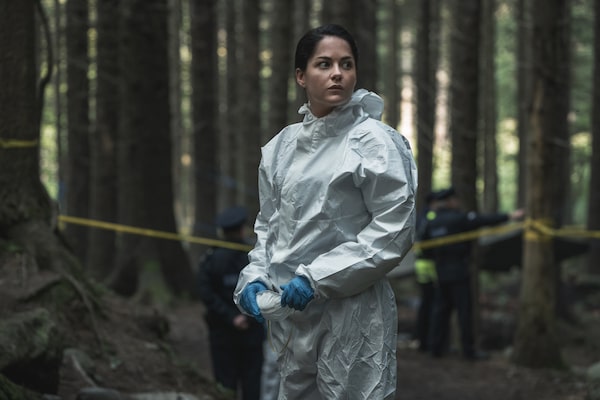
Sarah Greene (left) as Detective Cassie Maddox with Killian Scott as Detective Rob Reilly in the series Dublin Murders.Steffan Hill/Handout
Every now and then, a reader writes to me and says, “That was stupid.” This usually comes after the reader has consumed a series that got a very favourable review in this space. Not often, mind you, but it happens.
As long-suffering readers will know, this column cannot be 100 per cent reliable in matching TV content to every taste. No critic can be 100 per cent reliable. Sometimes, this column sees three episodes of an eight-part series and likes it a lot. Then the series goes awry, later on. This year, the second season of Big Little Lies went off the rails, a fact that wasn’t obvious in early episodes sent for review.
Besides, there is the matter of context and reader expectation. People like to see convention followed in certain genres and the upending of convention can upset people. Context is sometimes about subtlety that isn’t obvious to everyone.
Such is the case with Dublin Murders (streams on Starz/Crave). An eight-part crime drama, it has received very mixed reviews, especially in the U.S. In part that’s because there’s a lot going in, and not every reviewer is alert to what the complicated plotting might signify, or how it might resonate with different audiences. It’s a very tricky one, deeply sinister, twisted and involving, but not to everyone’s taste.
Based on two of the bestselling and award-winning novels by Irish-American writer Tana French, it seems straightforward on the surface. Two lead detectives in the Dublin Murder Squad, Rob Reilly (Killian Scott) and Cassie Maddox (Sarah Greene) are assigned a case: The body of a teenage girl is found in woods near Dublin, located in a place that suggests a ritual killing. They start their work and it’s clear they have a unique understanding of each other. They’re as close as a married couple. Then Cassie tells Rob that he knows they can’t take the case. It’s impossible, she says, and he must know why.
It’s a while before the viewer does. What’s important to note is that their case is unfolding in 2006. This is the Ireland of the Celtic Tiger boom. There’s a lot of money floating around and dubious business is being done.

Cassie, seen here, tells Rob that he knows they can’t take the case. It’s impossible, she says, and he must know why.Steffan Hill/Handout
In the plot line, what matters is that the location of the girl’s body is precisely where a mysterious event happened in 1984. Back then, three kids were playing in the woods but only one came home, a traumatized boy named Adam. He said he couldn’t remember what happened there. Then his family moved away.
Again, on the surface, things proceed as you might expect. Dublin is presented as gorgeously gloomy, chilly and slightly sinister. The two detectives reluctantly work the case, trying to link this murder to what happened in 1984. Rob is a bit obsessive about that, and it is soon revealed why. Cassie becomes aware that she’s being followed and her home has been entered. She seems worried but not frightened. Meanwhile, Rob chain-smokes and brushes off casual insults at work. The insults come because he’s an Englishman working in an Irish murder squad.
For much of its course, Dublin Murders is an atmospheric, traditional mystery. And then there are plot twists that demand a suspension of disbelief. You become aware this isn’t very conventional at all. There’s a murder, and there are several entangled mysteries, but below the surface there are penetrating themes that amount to psychological observation and social commentary.
Dublin Murders (seven of eight episodes have streamed, the eighth arrives Friday and all seven are on-demand now) is about childhood trauma and the certainty of that trauma being resurrected in adulthood. It is also about modern Ireland – the country itself is seen as rather like a person nearing adulthood but still dealing with an unnerving past, almost replicating the situation of that traumatized child in adulthood.
Remember that if you’re drawn to what is an unusually ethereal mystery, one that is tricky and sometimes off-kilter. You’ve been warned. The cast is excellent, by the way. Killian Scott and Tom Vaughan-Lawlor (who appears as a very shifty police officer) starred in the classic Irish crime drama Love/Hate. And Sarah Greene was in Showtime’s dark drama Penny Dreadful.
And with that I leave you for a couple of weeks. Enjoy the holidays and everything you consume, and be good and kind to everyone.
Live your best. We have a daily Life & Arts newsletter, providing you with our latest stories on health, travel, food and culture. Sign up today.